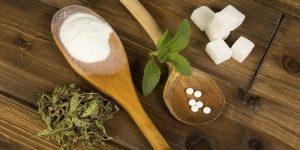In recent times, we have seen a shift to a more calorie-conscious and wellness driven mindset, which has increased the appetite for healthier, low-calorie alternatives. At the forefront of this trend, economically and controversially, are artificial sweeteners. This may seem like a new age shift, but the introduction of artificial sweeteners was carried out as early as the1850s.
But there is something different this time – A wave of skepticism fueled with information from the internet. There is constant doubt about whether artificial sweeteners are safer. What impact do they have on our health?
Let us talk about some of these brought out by leading institutions.
1. Sweeteners do not cause cancer
One of the most talked-about side effects of artificial sugar substitutes is that consuming them increases the risk of cancer. This controversial point was brought to light in 1970 when a study conducted on mice showed a significant increase in blood cancer risk. But ever since, no human research could scientifically link the use of artificial sweeteners with the risk of cancer – as stated by the National Cancer Institute, USA.
2. Using sweeteners may lead to weight gain
One primary concern about artificial sweeteners is that people consuming them may offset the weight loss or health benefits by replacing lost calories through other sources. This may lead to an increase in the daily calories in the food you intake. In 2005, a study conducted by the University of Texas Health Science Center at San Antonio showed that using diet coke led to increased weight gain and obesity. On the other hand, other studies show that people maintain the same diet as they usually would, leading to no additional calories.
3. Good for Oral Health
Dental decay arises when the bacteria in your mouth ferment sugar, creating acid, which further leads to tooth enamel. This is where artificial sweeteners come into play. Unlike sugars, they do not react with the bacteria in your mouth and help prevent tooth decay.
4. Sweeteners could disrupt gut bacteria balance
According to a study, some artificial sweeteners may change the balance of bacteria in one’s gut. An upset stomach could lead to various problems such as weight gain, a weakened immune system, poor blood sugar control, metabolic syndrome, and disrupted sleep.
So, finally – Sugar or Artificial Sweeteners?
Many other controversies and debates surround artificial sweeteners – each having acertain weightage and research backing it. The dispute remains the same – that most of these studies are observational. The hypothesis hence does not have proper scientific backing. Simply said, this field is one that is yet to be intensively explored.
But when it comes down to choosing between sugar or artificial sweeteners, it solely depends on your primary goal and how you weigh out the pros and cons of each.
The US FDA has greenlighted certain high-intensity artificial sweeteners. These sweeteners include acesulfame potassium, neotame, saccharin, sucralose, and aspartame. They also include some of the best artificial sweeteners, such as natural plant-derived stevia and monk fruit extract.
Your best friend here is the food packaging. Nutrition fact labels on products can help you identify sugar substitutes and sugar added and listed on the ingredient list. Pay attention to the quantum of added sugar as against natural sugar. Being aware is half the battle won!
In either case, one thing to keep in mind is moderation – To strike a balance and not excessively consume either sugar or a sugar substitute. Else, the treat will turn out to be the trick.
References:
- https://www.healthline.com/nutrition/artificial-sweeteners-good-or-bad#dental-health
- https://kids.frontiersin.org/article/10.3389/frym.2019.00051
- https://www.mayoclinic.org/healthy-lifestyle/nutrition-and-healthy-eating/in-depth/artificial-sweeteners/art-20046936#
- https://www.health.harvard.edu/blog/artificial-sweeteners-sugar-free-but-at-what-cost-201207165030
- https://www.consumerreports.org/sugar-sweeteners/the-truth-about-sugar-vs-artificial-sweeteners/
- https://www.cnet.com/health/sugar-vs-artificial-sweeteners-which-is-healthier/
- https://health.clevelandclinic.org/whats-worse-sugar-or-artificial-sweetener/
- https://www.ncbi.nlm.nih.gov/pmc/articles/PMC3198517/
- https://www.medicalnewstoday.com/articles/323469






